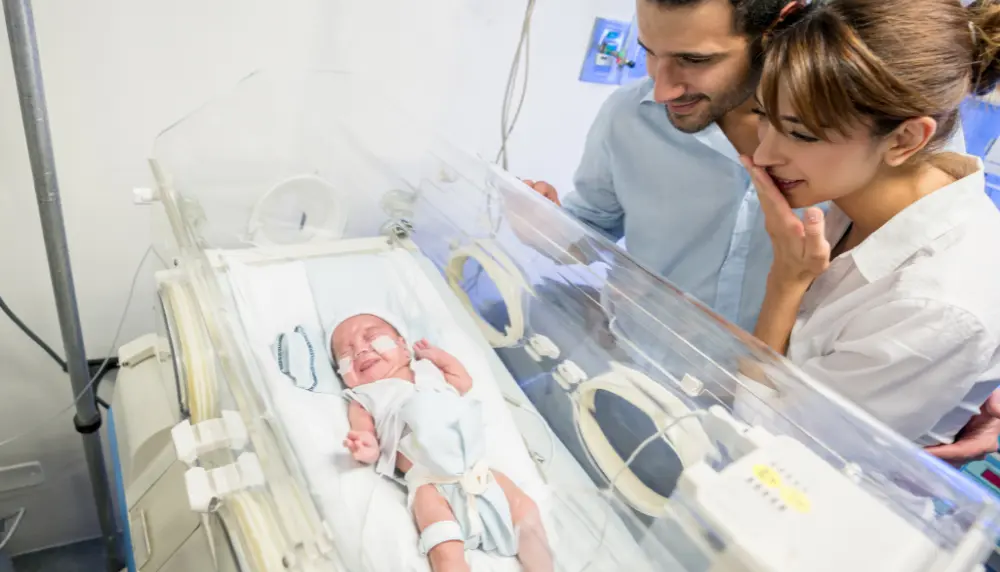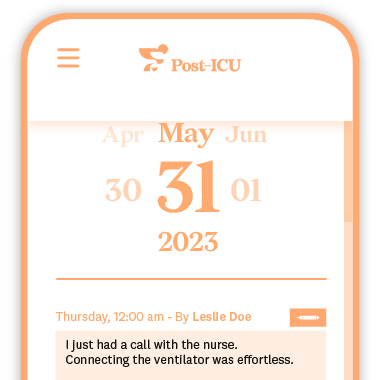The Neonatal Intensive Care Unit (NICU) and Pediatric Intensive Care Unit (PICU) environments can be a source of considerable stress and emotional strain for families. Feelings of powerlessness, loss, and guilt are common as parents navigate the unfamiliar and sterile NICU/PICU setting. However, a new approach is developing that shows promise in improving the experience for both families and patients, as well as critical care staff: digital diaries.
This article explores the potential of digital diaries to empower families in the NICU/PICU, improve communication with caregivers, and ultimately lead to better outcomes for everyone involved.
The Trauma of NICU/PICU Stays and the Value of Journaling
Roughly 10% to 15% of all births in the United States result in a stay in the NICU1Goodstein, M., Stewart, D., Keels, E., & Moon, R. (2021). Transition to a Safe Home Sleep Environment for the NICU Patient. Pediatrics, 148.. NICU patients encounter bright lights, constant noise, and unfamiliar procedures in the first days of their lives. This stressful environment can be equally difficult for parents, who are separated from their child and struggle with feelings of fear, uncertainty, and loss.
However, Family-Centered Care (FCC) approaches are helping by:
- Reducing Stress for Parents and Infants: Studies have shown that FCC approaches can significantly reduce stress and anxiety for parents in the NICU/PICU. This, in turn, can lead to a calmer and more supportive environment for infants, potentially contributing to improved healing.2Fuenmayor, M. E. F., Fawcett, A., Schwartz, K. E., Horner, S., Balasundaram, M., Burke, B. L., … & Fry, J. T. (2024). Understanding family-centered care in the NICU: a scoping review protocol. JBI Evidence Synthesis, 10-11124.3Gómez-Cantarino, S., García-Valdivieso, I., Moncunill-Martínez, E., Yáñez-Araque, B., & Ugarte Gurrutxaga, M. I. (2020). Developing a family-centered care model in the neonatal intensive care unit (NICU): a new vision to manage healthcare. International journal of environmental research and public health, 17(19), 7197.
- Involving Parents in Decision-Making: FCC fosters open communication between families and healthcare providers, allowing parents to participate actively in their child’s care decisions. This collaborative approach can lead to more informed decision-making and a stronger sense of control for families.4Fuenmayor, M. E. F., Fawcett, A., Schwartz, K. E., Horner, S., Balasundaram, M., Burke, B. L., … & Fry, J. T. (2024). Understanding family-centered care in the NICU: a scoping review protocol. JBI Evidence Synthesis, 10-11124.
- Improving Infant Development: Research suggests that FCC practices can positively impact infant development. Reduced stress levels and stronger parent-infant bonds can contribute to better cognitive and emotional outcomes for children in the long term.5Gómez-Cantarino, S., García-Valdivieso, I., Moncunill-Martínez, E., Yáñez-Araque, B., & Ugarte Gurrutxaga, M. I. (2020). Developing a family-centered care model in the neonatal intensive care unit (NICU): a new vision to manage healthcare. International journal of environmental research and public health, 17(19), 7197
In this patient-centered approach, journaling emerges as a powerful tool. By expressing their thoughts and feelings in a diary, parents can gain clarity and perspective, allowing them to better navigate the emotional rollercoaster of a NICU/PICU stay. This practice not only benefits parents but also contributes to the overall well-being of the child through a more supportive and collaborative care environment.
The Benefits of Digital Diaries: Evidence-Based Support
Digital diaries offer benefits for both parents and infants in the NICU/PICU environment, as well as hospitals and ICUs through:
Empowering Parents
Research has shown that involving parents in their child’s care through FCC approaches can significantly reduce stress and feelings of helplessness.6Balbino, F. S., Balieiro, M. M. F. G., & Mandetta, M. A. (2016). Measurement of Family-centered care perception and parental stress in a neonatal unit. Revista latino-americana de enfermagem, 24, e2753.Digital diaries provide a platform for parents to actively participate in their child’s care journey, document their observations and questions, and collaborate more effectively with the care team. This empowerment contributes to a more positive and engaged experience for parents during a challenging time.
Improved Infant Well-being
Studies have demonstrated the positive impact of FCC on infant outcomes.7Gómez-Cantarino, S., García-Valdivieso, I., Moncunill-Martínez, E., Yáñez-Araque, B., & Ugarte Gurrutxaga, M. I. (2020). Developing a family-centered care model in the neonatal intensive care unit (NICU): a new vision to manage healthcare. International journal of environmental research and public health, 17(19), 7197.By reducing separation anxiety, digital diaries can contribute to the overall well-being of NICU/PICU families and that has an impact on the patients as well. Parents can use the diary to express love and encouragement for their child, fostering a sense of connection despite physical separation.
Enhanced Bonding
The early stages of parent-infant bonding are crucial for long-term development. One of the most stressful aspects of NICU for parents is the was the alteration of the parental bond.8Hofbauer, J. M., Dieplinger, A. M., & Nydahl, P. (2021). The meaning of NICU-diaries to parents of premature children in the neonatal intensive care unit: Trust that everything will be fine. Journal of Neonatal Nursing, 27(6), 432-438. Digital diaries can be a powerful tool for promoting this vital bond. Parents can record their thoughts, feelings, and experiences alongside pictures and videos of their child, creating a cherished record of their journey together. This not only helps parents stay connected during separation but also provides a valuable resource for strengthening the bond after discharge.
Increased Understanding between Family Members
Both parents can contribute to the diary and share their thoughts and feelings through the journaling process. Since both parents have access to these entries, they can read each other’s contributions and get insight into where they are in the trauma process. This type of indirect communication between parents helps increase understanding.
May Reduce Postpartum Depression
The mother of a NICU baby is a parent but also a patient. Frequently, the parental role takes over and mothers put aside the fact that they’ve just gone through giving birth and also need to take care of their physical and mental health. Postpartum depression is more common among mothers of infants admitted to the neonatal intensive care unit (NICU) compared to the general population. Studies have found the incidence of PPD of up to 40% in this group9Shovers, S. M., Bachman, S. S., Popek, L., & Turchi, R. M. (2021). Maternal postpartum depression: risk factors, impacts, and interventions for the NICU and beyond. Current opinion in pediatrics, 33(3), 331-341.. Having an outlet to express emotions and process this traumatic situation might help mothers take care of their psychological health while their baby is in the NICU. More research is required to confirm that diaries have this impact.
"This practice not only benefits parents but also acknowledges the mother as a patient, empowering her recovery, supporting her mental health, and allowing her to track her emotional progress. These benefits promote fewer instances of postpartum depression and a healthier family environment."
Martika Heath, Former Maternity Care Assistant Tweet
The Neo-Diary: Next Step in Introducing FCC into Your NICU
Neo-Diary is a digital journaling application specifically designed to support FCC principles in the NICU/PICU environment. It combines the benefits of digital journaling with FCC by allowing parents to:
- Write detailed entries about their experiences and feelings.
- Include precious multimedia like pictures and videos to personalize their entries, fostering a stronger bond with their child.
- Share updates and questions directly with caregivers, promoting open communication and collaboration.
- Collaborate with nurses by documenting their child’s progress and observations within the diary, creating a shared record of the infant’s journey.
By embracing digital journaling programs like Neo-Diary, hospitals have the opportunity to improve the NICU/PICU experience, fostering a more supportive and family-centered environment that benefits patients, families, and staff alike.





